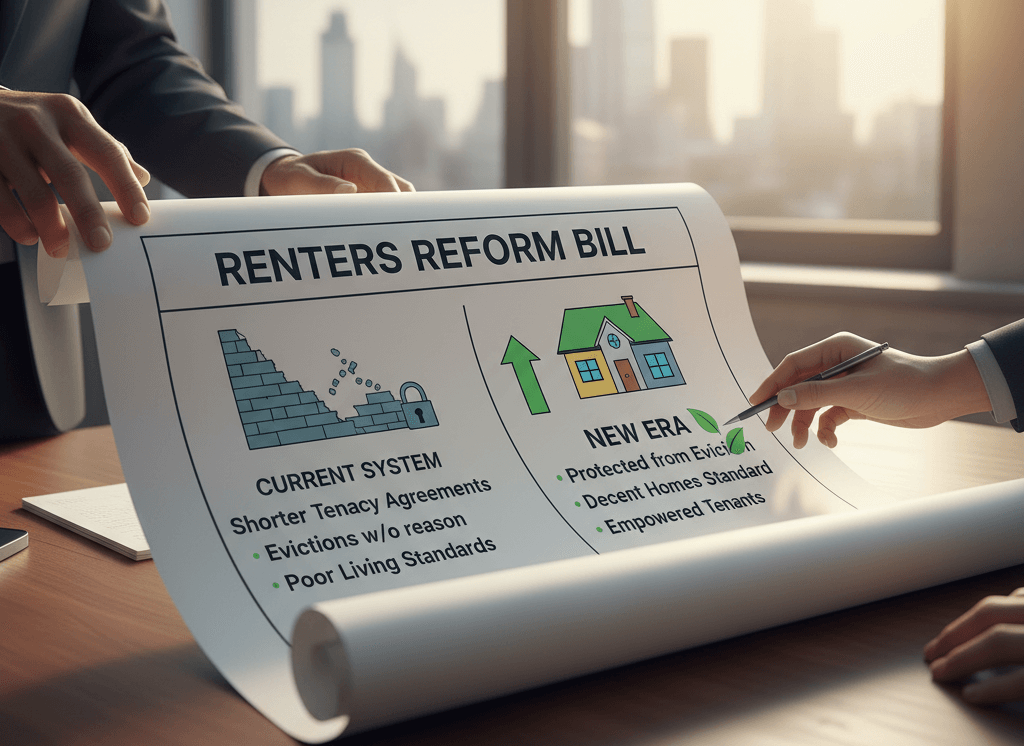
10 key points of the
Renters’ Rights Bill
The Renters’ Reform Bill is a long-awaited piece of legislation that is set to have a significant impact on the UK property industry.
First introduced by the Conservatives at the Renters’ Reform Act, it was updated and reintroduced to Parliament by Labour as the Renters’ Rights Bill, and could be enforced in law by the summer of 2025.
In this post, we will provide ten of its key points.
The bill was created in response to the recognition that the existing legal framework did not adequately protect the rights and well-being of the millions of people living in privately rented homes in England. It aimed to professionalise the industry, giving better security for tenants. At the same time, by providing a simplified route to the justice system, it aims to enhance the reputation of the industry by pushing out rogue landlords.
What are its key provisions?
1. The abolition of “No-Fault” Evictions.
Currently, landlords can evict at any time, without providing a reason, by serving a Section 21 notice. This will be replaced with Section 8, which will require a legitimate reason for eviction, such as anti-social behaviour, significant rent arrears, or simply wanting to sell the property or move themselves or their family into the property.
However, all tenants will be safeguarded by an initial 12-month protected period, during which landlords cannot evict. After this, the latest Renters Reform Bill has increased the mandatory threshold for rent arrears from two months to three months before a landlord can gain possession.
2. Ending Fixed-Term Tenancies
The end of all existing assured shorthold tenancies (ASTs) which provide fixed-term rentals. Instead, tenancies will not have a fixed date, and all tenants will be able to give two months’ notice to end the rental at any time.
3. Rent Increase Reform
Landlords will only be able to increase rent once a year. This will require a Section notice and will have to be provided with two months’ notice. If a tenant feels the amount is unfair, they will be able to challenge this at a tribunal.
In addition, landlords will have to advertise a rate and stick to it, with the bill making it illegal for landlords or agents to ask for or accept rent offers above the advertised price. This means an end to ‘bidding wars’ so renters won’t have to compete with others willing to bid higher.
4. Introducing a Private Rented Sector Ombudsman
All disputes will be handled by an ombudsman scheme to deliver a fair and impartial dispute resolution service. The aim is to speed up the process without recourse to the court system.
5. Creation of a Private Rented Sector Database
All landlords will be required to register themselves and their properties, thus improving transparency and the enforcement of standards.
6. Introduced the Decent Homes Standard to the private sector
As per social housing, rental sector properties will now have to reach a minimum standard, such as being free from being warm, free of leaks, and with basic, adequate facilities.
7. Pet Rights
Landlords will no longer be able to refuse the right of tenants to have a pet but will have to consider all requests and only refuse with good reason. Equally, landlords can require tenants to take out pet insurance to cover damages.
8. Prohibition of Discrimination
Landlords will be prohibited from discriminating against tenants who receive benefits or those who have children.
9. Toughening Rent Repayment Orders
Building on current legislation, tenants will be able to reclaim rent for up to 24 months, an increase from the current 12 months.
10. Implementing “Awaab’s Law”
Landlords will be required by law to respond to serious health hazards, such as damp and mould, promptly. This law is named after a petition by the parents of Awaab Ishah, who died from poor conditions, after requests to fix these were ignored.
To find our more this blog post from Savills examines some of the consequences for landlords and tenants; in this post, Bidwells advises landlords how to prepare, while on its blog, JLL gives its view on how the bill could reshape residential investment.


